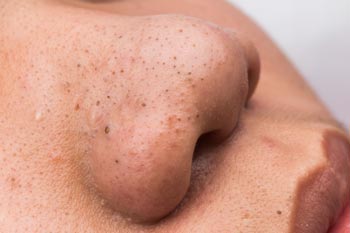Effective Ways To Get Rid Of Blackheads
 Common and annoying, blackheads occur when your pores become clogged with excess sebum (an oil created by the sebaceous glands that keeps skin supple) and dead skin cells.
Common and annoying, blackheads occur when your pores become clogged with excess sebum (an oil created by the sebaceous glands that keeps skin supple) and dead skin cells.
The difference between a black head and a white head is simply whether or not the pore is open or closed. If the pore is open, the plug of sebum/skin cells oxidizes as it is in contact with the oxygen in the air, which turns it black.
Blackheads are not caused by dirt. Let’s make that clear from the beginning. Scrubbing your face obsessively is not a good way to get rid of your blackheads, and is only going to make it worse as you’ll just end up drying out your skin, which will cause more oil to be created to make up for everything you stripped away, and…well it’s a vicious cycle. For this reason, don’t use some of these remedies more than 2-3 times a week, such as the sugar scrub and pore strips. I know it can be hard to resist, but your skin will be better off this way.
Normal daily cleansing of the skin is part of managing acne. No further improvement is seen, however, with scrubbing or a greater frequency of washing. In fact, excessive face-washing can cause irritation and increase the risk of infection.
– People with blackheads and no other acne lesions may find it helpful to use a gel, cream or wash that contains benzoyl peroxide. These products are available at pharmacies and have comedolytic and antibacterial properties, meaning that they help to break down the plugs of sebum and prevent inflammation caused by bacteria.
– It may be tempting to squeeze a blackhead, but this can worsen the problem. Sometimes extraction with a sterile tool at the clinic can be appropriate.
– Prescription treatments for non-inflammatory acne (whiteheads as well as blackheads) tend to be more effective than consumer products. These include gels or lotions containing retinoids (vitaminA), antibiotics, benzoyl peroxide (antibacterial) or azelaic acid. These options are also prescribed as combination treatments.
These products do pose a risk of adverse effects, especially in pregnancy, and should only be used as advised by a qualified health care practitioner.
– Oral antibiotics may be used to treat mild acne, although these are not a specific treatment for noninflammatory blackheads. Hormonal agents, such as the oral contraceptive pill, can help with the problem of sebum production.
– Drugs containing high levels of vitamin A should not be used by those who are pregnant or who are trying to conceive as they can cause serious birth defects.
– Picking, squeezing and popping blackheads and other acne lesions – these actions, while perhaps providing some initial satisfaction, in fact worsen lesions by causing inflammation and potential scarring Abrasive scrubs for washing acne – these do not improve the condition and may cause irritation.
– Severe inflammatory lesions can be individually treated by dermatologists. Where other treatment has not helped, simple comedones, including blackheads, may be treated using a specially designed tool to extract the material plugging a pore.
